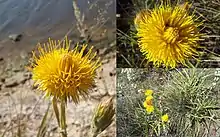Schlechtendalia luzulifolia
Schlechtendalia is a genus of South American plants in the tribe Barnadesieae within the family Asteraceae.[3][4][5] It is known in Portuguese as bolão de ouro, meaning "gold bullion". It is a perennial herbaceous plant, with rigid, linear leaves with a pointy tip. The corollas of the florets are yellow, and of the subbilobiate type,[6] with four lobes merged into a strap, but split into teeth over half as deep, and one lobe (towards the centre of the flowerhead) free. This species flowers from September to December and the fruits are ripe in January or February.[7] The only known species is Schlechtendalia luzulifolia, native to southern Brazil (Paraná, Rio Grande do Sul), Uruguay (Cerro Largo, Maldonado, Montevideo, Rocha), northern Argentina (Buenos Aires, Entre Ríos). This species has sixteen chromosomes (2n=16).[8]
| Schlechtendalia luzulifolia | |
|---|---|
 | |
| Scientific classification | |
| Kingdom: | Plantae |
| Clade: | Tracheophytes |
| Clade: | Angiosperms |
| Clade: | Eudicots |
| Clade: | Asterids |
| Order: | Asterales |
| Family: | Asteraceae |
| Subfamily: | Barnadesioideae |
| Tribe: | Barnadesieae |
| Genus: | Schlechtendalia Less. |
| Species: | S. luzulifolia |
| Binomial name | |
| Schlechtendalia luzulifolia | |
| Synonyms[2] | |
| |
Species previously assigned Schlechtendalia
Etymology
The genus name honors German botanist Diederich Franz Leonhard von Schlechtendal.[3] The species epithet luzulaefolia, refers to this plant having leaves similar to a woodrush.
References
- Tropicos, search for Schlechtendalia
- Flann, C (ed) 2009+ Global Compositae Checklist Archived 2014-11-06 at archive.today
- Lessing, Christian Friedrich. 1830. Linnaea 5: 242–243 in Latin
- Lessing, Christian Friedrich. 1830. Linnaea 5: plate III (3), figures 51–55 line drawings of flowers of Schlechtendalia luzulifolia
- Tropicos, Schlechtendalia Less.
- Suessy, Tod F.; Urtubey, Estrella (2006). "Phylogenetic implications of corolla morphology in subfamily Barnesioideae (Asteraceae)". Flora. 201: 343. figure 2 illustrates corolla types
- Fior, Claudimar S.; Carneiro, Andréia M.; Busnello, Ângela C.; Leonhardt, Cristina (2015). "Schlechtendalia luzulifolia Less.: estudos de propagação e localização de populações [Schlechtendalia luzulifolia Less: studies of Propagation and location of populations]". Revista Brasileira de Biociências. Porto Allegre, Brazil. 5: 771–773.
- Gruenstaeudl, Michael; Urtubey, Estrella; Jansen, Robert K.; Samuel, Rosabelle; Barfuss, Michael H.J.; Stuessy, Tod F. (2009). "Phylogeny of Barnadesioideae (Asteraceae) inferred from DNA sequence data and morphology". Molecular Phylogenetics and Evolution. 51 (3): 572–87. doi:10.1016/j.ympev.2009.01.023. PMID 19264147.